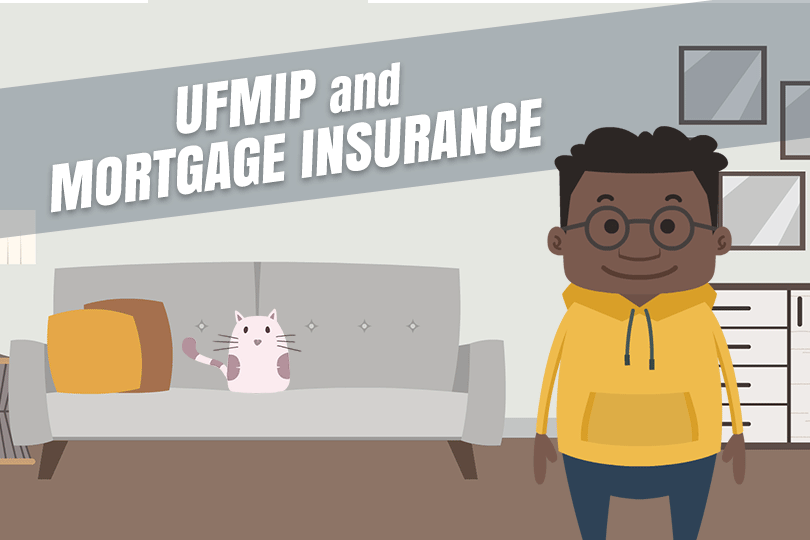Homeowner's Insurance - Why Do We Need It?
March 6, 2021
Homeowner’s insurance provides coverage to repair or rebuild your home, in the instances that are spelled out in the policy. Also known as hazard insurance, homeowner’s insurance typically covers damages to the house that occur from fire, smoke, theft, vandalism, and bad weather such as lightning, wind, or hail. Most policies also cover things inside in the home, such as furniture, electronics, and other possessions. They also cover the medical expenses and legal fees if people other than those living in the home are injured on the property.
Homeowner’s Insurance vs. Mortgage Insurance
Securing a homeowner’s insurance policy is required by your lender, but it is important that you do not confuse this policy with your mortgage insurance. While it is common to mix the two up, they are not the same! Homeowner’s insurance protects the borrower, while mortgage insurance protects the lender.
In the case of FHA loans, a monthly mortgage insurance premium (MIP) is paid along with the Up-front Mortgage Insurance Premium (UFMIP). In addition to funding the FHA, this mortgage insurance is there to protect FHA-approved lenders in case the borrower cannot repay the loan.
Similarly, conventional loans require private mortgage insurance (PMI). PMI is charged when borrowers make less than a 20% down payment on a conventional loan, making it riskier on the lender. The private mortgage insurance typically costs between 0.5% and 1% and is paid monthly until the borrower pays down enough on the principal amount - generally 20%, when the loan is no longer considered high-risk).
Never Assume
Unless specifically spelled out in your policy, do not assume that you are covered. Always keep in mind that you cannot claim coverage for issues that are not specified in your policy. This includes floods and earthquakes, but it may also apply to water damage from sewer pipes or storm drains, etc. Remember that flood and earthquake insurance is always sold separately. If you buy a home in an area designated as a flood zone or one that is prone to earthquakes, your lender may require that you purchase these additional policies.
Read and re-read your insurance policy so you know exactly what you are covered for. The wording of your agreement may be complicated, so take the time to ask your insurance agent as many questions as you have.
Costs and Coverage
The cost of your homeowner’s insurance policy varies based on several factors. First, there is the location of your home. This includes a bunch of factors within itself, such as how far your home is from a fire station, or how close it is to a body of water. Expect to pay a higher premium if you live in a high-crime neighborhood.
The age of your home will also affect the amount you pay. If you are purchasing a home built over 20 years ago, it stands to reason that there will be some upcoming claims for renovation. On the other hand, big upgrades such as a new roof or plumbing can bring down the cost of insurance.
A big factor that affects your insurance cost is the coverage you select. You can choose to have more extensive coverage in your policy if you have more valuables in your home, or to protect yourself from liability issues, but this will understandably raise your premium. The premium also varies based on the deductible you select. A higher deductible could reduce your premium costs up to 25%.
Finally, your insurance premium might look different from someone with the exact same policy because of your credit history. While a provider cannot refuse a homeowner, coverage based on their credit, they might offer a discount on the policy if their credit score is high enough. This gives borrowers one more reason to work on their credit when getting ready to buy a home.
------------------------------
RELATED VIDEOS:
Understand the Reasons for Private Mortgage Insurance
Carefully Read Your Closing Disclosure
Buying a Home With a Co-Borrower

FHA Loan Articles
January 30, 2025FHA residential refinance loans, insured by the Federal Housing Administration, allow homeowners to refinance their existing mortgages. They potentially have more flexible qualification requirements than conventional loans. FHA refi loans can lower monthly payments, shorten the loan term, consolidate debt, or even access cash for home improvements or other needs. Understanding the eligibility criteria and different refinance options is crucial for homeowners considering this option.
January 29, 2025Are you about to graduate from college and are already thinking of what your dream home might look like? Understanding the intricacies of the mortgage is an essential step in your journey toward home ownership. Two key terms you'll encounter early on are "FICO score" and "credit history." How do these two things affect your ability to buy a home?
January 28, 2025Are you dreaming of transforming a diamond-in-the-rough house into your ideal home? Fixer-uppers offer a unique opportunity to personalize your living space and potentially build equity at a price lower than some occupant-ready homes.
January 27, 2025When buying or selling a home, two critical processes are often confused: the appraisal and the inspection. Though both involve a thorough examination of the property, they serve distinct purposes and provide different types of information vital to a successful FHA loan transaction.
January 22, 2025Consider this scenario: you've been in your home for five years or more and you've likely built up a significant amount of equity, and now you might be wondering how to put that equity to work for you. Whether you're dreaming of a major renovation, need to consolidate debt, or want to help a child with college tuition, you have options. Two choices are an FHA cash-out refinance and a home equity line of credit (HELOC).







